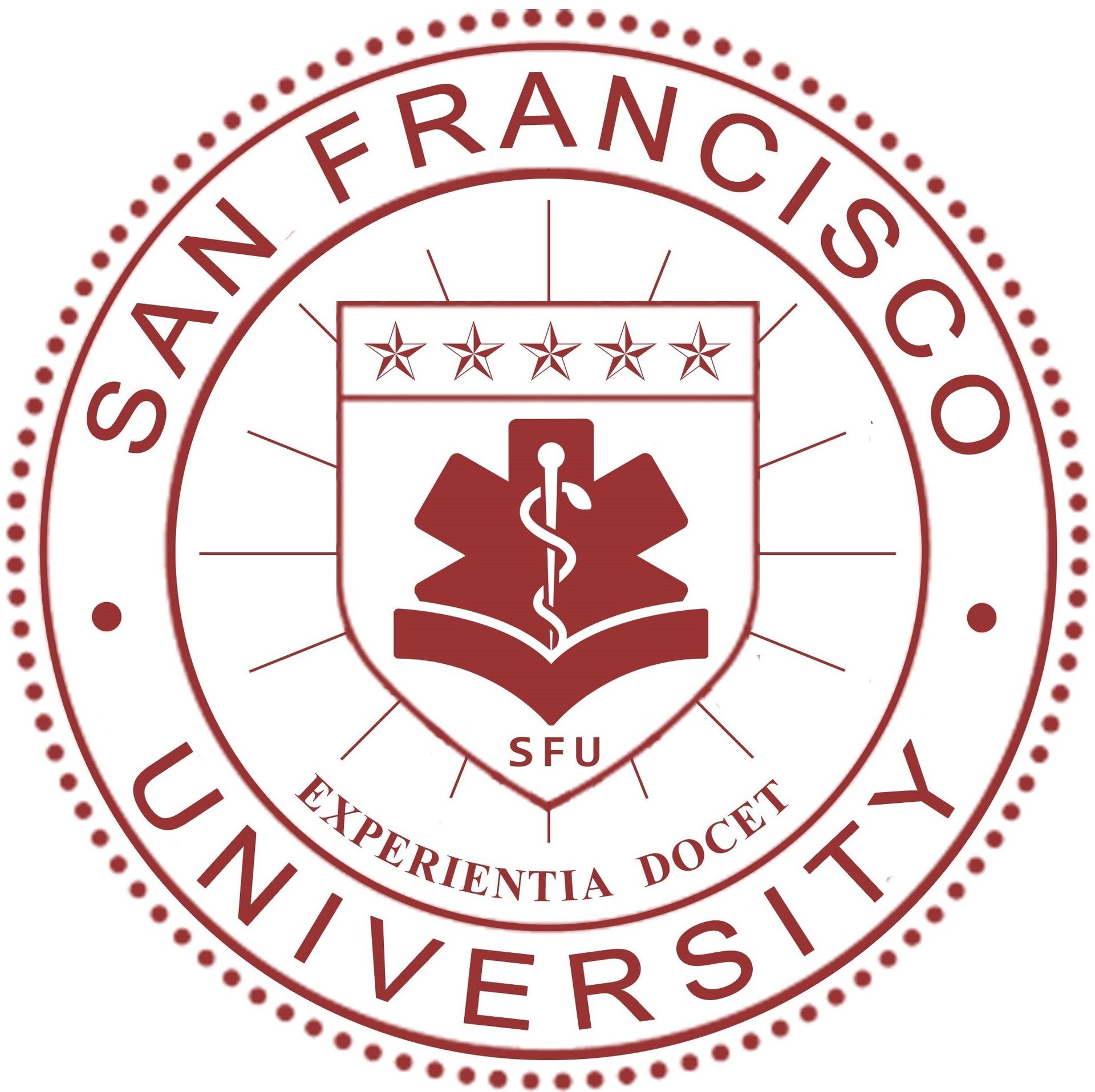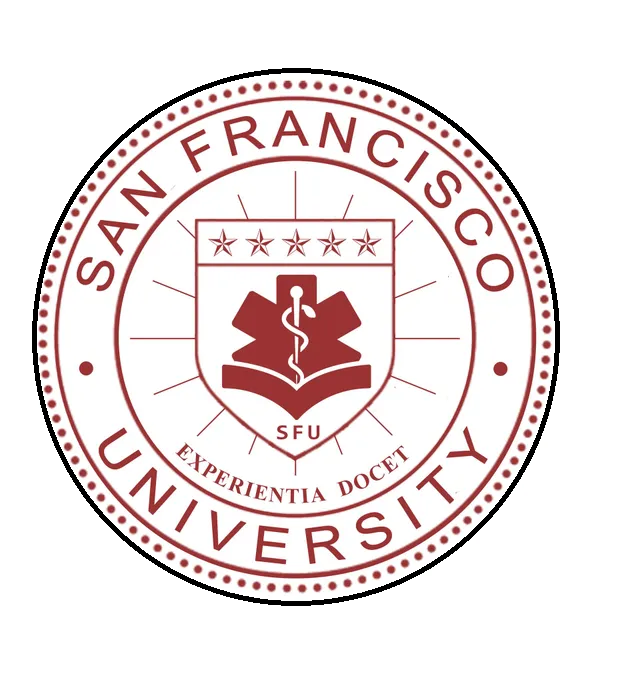Graduate College
At SFUGC, you may earn Master of Science (M.S.) or Philosophy Doctor (Ph.D.) degrees in Biotechnology/Bioengineering, Genomics and Proteomics, Nanotechnology, Nutrition and Metabolomics, Nursing, Optometry, Pharmacology and Toxicology, Immunology and vaccines, Health Services Administration, Artificial Intelligence and Bioinformatics. You may gain hands-on experience at the SFUGC laboratories and during elective internships at the US leading companies.
Master of Science (M.S.) Program Admission Requirements and Process
ButtonThe following credentials are expected from the candidates for joining the Master of Science (MS) at SFUGC.
1.A.
Candidates willing to boost their credentials by earning a dual M.D., M.S., degree: diploma from a medical school with Medical Doctor (M.D.) or Doctor of Osteopathic Medicine (DO), or Medicinae Baccalaureus, Baccalaureus Chirurgiae (M.B.B.S. or B.M.B.S.) degree;
1.B.
Candidates willing to boost their credentials by earning a dual J.D., M.S., degree: diploma from a law school and transcripts from a graduate level courses of Anatomy, Physiology, Histology, Biochemistry and Pathology (such courses are available at SFUGC).
1.C.
Candidates willing to switch their career goals from medicine into science, while at medical schools: certificates of passsed USMLE 1 or NBME Comprehensive or transcripts from a graduate level courses of Anatomy, Physiology, Histology, Biochemistry and Pathology (such courses are available at SFUGC).
1.D.
Candidates with B.Sc., B.Nurs., B.Pharm., B.Nutr. : Bachelor Diploma and transcripts from a graduate level courses of Anatomy, Physiology, Histology, Biochemistry and Pathology (such courses are available at SFUGC)
2.
A certificate of English-speaking proficiency or a transcript from
a course, or indication included in 1 (in its absence a request to take it at the SFU prior to participation in the instruction).
3.
A certificate of Math / Statistics proficiency or a transcript from a course, or indication included in 1 (in its absence a request to take it at the SFU).
4.
Signed statement of compliance with the SFU Freedom of Speech Policy.
5.
Signed statement of compliance with the SFU Non-discrimination and Equal Opportunity Policy.
6.
Signed statement of taking yourself full responsibility of your own health issues.
7. (optional)
Request for help in accommodation in SF.
8. (optional)
Request for help with visa.
9.
Format preference of classes:
9A.
In-person, in SF full time;
9B.
hybrid (part on-line, part in-person);
9C.
on-line, full time.
+
9D.
am SF time zone
or
pm SF.time zone.
The SFU will adjust the courses accordingly to preferences of groups of students.
10.
Formal letter of application that includes first name, last name, full residency address, telephone/whatsup/signal/etc, and email, for admission to the M.S., or Ph.D. (or Sc.D.) without specified preference of the specialty
or
with preference specified (Nutrition and Metabolomics, Nursing, Pharmacology, Toxicology, Biotechnology and Genomics/Proteomics, Bioinformatics, or Artificial Intelligence). The application has to indicate the quarter and date wishing to start (see Calendar).
The application has to indicate the preferred format (in-residence, hybrid, on-line, etc).
The application has to contain the applicant's consent that the SFU verifies the documents submitted.
Upon receiving the application, the confirmation of receiving it will be emailed to the applicant together with the bank account information for the application fee payments. Only after receiving all the documents and payment for the application, the application will be reviewed by the Admisssion Committee, the decision rendedred and conveyed to the applicant.
Master of Science (M.S.) Program Curriculum
The Curriculum consists of two parts: (1) foundational basic sciences; (2) dissertation.
(1) This part consists of the direct interactions with the faculty: lectures, seminars, conferences, and demos, which are dedicated to provide the graduate students with the foundations to independent work. critical analysis of data, creative thinking, basic lab techniques, AI programming, supercomputer programming, molecular modeling, etc. It is led by the SFU Faculty and Staff. It is crafted individually to the tune of the student's choice of the Thesis.
(2) This part involves an independent work on acquisition of data for and writing the dissertation in a student elected format, while guided by the Thesis' Advisor. The research may involve wet-lab work at the SFU laboratories or AI-guided metanalysis or molecular modeling using SFU and National Supercomputer Center computing power. Thesis work can be conducted either in-residence in San Francisco or any of the SFUGC affiliated laboratories, clinics, and/or facilities (check availability with the info), i.e., at the student chosen environment.
Cumulatively, both parts are planned to result in earning 40 credits over 4 quarters needed for graduation from the Program and earning the degree: Master of Science (M.S.). The duration is contingent upon the student's quarterly elected workload.
Master of Science (M.S.) Degree Awarding Requirements
Requirements to be awarded Master of Science (M.S.) degree:
1.
Record of 40 graduate school-level credits (cumulative: transferred to and/or earned at the SFU).
2.
Completed, submitted, and accepted by the SFU Graduate Committee Master's dissertation.
3.
Passed Master's exam.
Philosophy Doctor (Ph.D.) Program Admission Requirements and Process
ButtonThe following credentials are expected from the candidates for joining the Philosophy Doctor (PhD) Program at SFUGC.
1.A.
Candidates willing to boost their credentials by earning a dual M.D., Ph.D., D.O., Ph.D., M.B.B.S., Ph.D. degree: diploma from a medical school with respectively Medical Doctor (M.D.) or Doctor of Osteopathic Medicine (DO), or Medicinae Baccalaureus, Baccalaureus Chirurgiae (M.B.B.S. or B.M.B.S.) degree;
1.B.
Candidates willing to boost their credentials by earning a dual J.D., Ph.D., degree: diploma from a law school and transcripts from a graduate level courses of Anatomy, Physiology, Histology, Biochemistry and Pathology (such courses are available at SFUGC).
1.C.
Candidates willing to switch their career goals from medicine into science, while at medical schools: certificates of passsed USMLE 1 or NBME Comprehensive or transcripts from a graduate level courses of Anatomy, Physiology, Histology, Biochemistry and Pathology (such courses are available at SFUGC).
1.D.
Candidates with B.Sc., B.Nurs., B.Pharm., B.Nutr. : Bachelor Diploma and transcripts from the transcripts from a graduate level courses of Anatomy, Physiology, Histology, Biochemistry and Pathology (such courses are available at SFUGC).
1.E.
Candidates with Master of Science degree: a copy of M.S. Diploma.
2.
A certificate of English-speaking proficiency or a transcript from a course, or indication included in 1 (in its absence a request to take it at the SFU prior to partiipation in the instruction).
3.
A certificate of Math / Statistics proficiency or a transcript from a course, or indication included in 1 (in its absence a request to take it at the SFU).
4.
Signed statement of compliance with the SFU Freedom of Speech Policy.
5.
Signed statement of compliance with the SFU Non-discrimination and Equal Opportunity Policy.
6.
Signed statement of taking yourself full responsibility of your own health issues.
7. (optional)
Request for help in accommodation in SF.
8. (optional)
Request for help with visa.
9.
Format preference of classes:
9A.
In-person, in SF full time;
9B.
hybrid (part on-line, part in-person);
9C.
on-line, full time.
+
9D.
am SF time zone
or
pm SF time zone.
The SFU will adjust the courses accordingly to preferences of groups of students.
10.
Formal cover letter of application that includes first name, last name, full residency address, telephone number, and email, for admission to the M.S., or Ph.D. (or Sc.D.) without specified preference of the specialty
or
with preference specified (Nutrition and Metabolomics, Nursing, Pharmacology and Toxicology, Biotechnology and Genomics/Proteomics, Bioinformatics, or Artificial Intelligence). The application has to indicate the quarter and date wishing to start (see Calendar).
The application has to indicate the preferred format of studying at SFUGC (in-residence, hybrid, on-line, etc).
The application has to contain the applicant's consent that the SFU verifies the documents submitted.
Upon receiving the application, the confirmation of receiving it will be emailed to the applicant together with the bank account information for the application fee payments. Only after receiving all the documents and payment for the application, the application will be reviewed by the Admisssion Committee. Thereafter, the decision will be rendedred and conveyed to the applicant.
Philosophy Doctor (Ph.D.) Program Curriculum
The Curriculum consists of two parts: (1) foundational basic sciences; (2) dissertation.
(1) This part consists of the direct interactions with the faculty: lectures, seminars, conferences, and demos, which are dedicated to provide the graduate students with the foundations to independent work. critical analysis of data, creative thinking, basic lab techniques, AI programming, supercomputer programming, molecular modeling, etc. It is led by the SFU Faculty and Staff. It is crafted to the tune of the student's choice of the Thesis.
(2) This part involves an independent work on acquisition of data for and writing the dissertation, while guided by the Thesis' Advisor. The research may involve wet-lab work at the SFU laboratories or AI-guided metanalysis or molecular modeling using SFU and National Supercomputer Center computing power. Thesis work can be conducted either in-residence in San Francisco or any of the SFUGC affiliated laboratories, clinics, and /or facilities or any of the SFUGC affiliated laboratories, clinics, and/or facilities (check availability with the info).
The Curriculum may be tuned to the students previous experience reflected by the transferred credits.The gradutes of Basic Sciences from the Medical Schools and M.D. may start working immediately on Thesis.
Cumulatively, both parts are planned to result in earning 80 credits over 8 quarters (that can be changed depending the credit load) needed for graduation from the Program and earning the degree: Philosophy Doctor (Ph.D.). used interchangeably, contingent upon the Thesis' profile as (Medical) Science Doctor (M.) S.D.
Philosophy Doctor (Ph.D.) Degree Awarding Requirements
Requirements to be awarded Doctoral (Ph.D.) degree:
1.
Record of 80 credits (cumulative: transferred to and / or at the SFU).
2.
Completed, submitted, and accepted by the SFU Graduate Committee Doctoral dissertation.
3.
Passed Doctoral exam.
Specialized Courses
Medical Basic Sciences
The college level courses cover: Chemistry, Bioogy, Physics, Math, English at the level facilitating admission to the Medical College and/or Anatomy and Histology, Physiology, Biochemistry at the graduate school level..
NBME Comprehensive
The NBME Courses prepare the students for passing the NBME Exams, including the final Comprehensive Basic Sciences Exam.
USMLE 1
THe USMLE Courses prepare the students for passing the USMLE 1 Exams.
Continued Medical Education (CME)
Specialized courses for graduates and professionals to earn CME credits.

